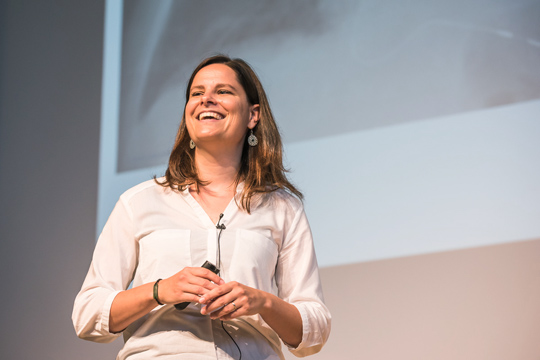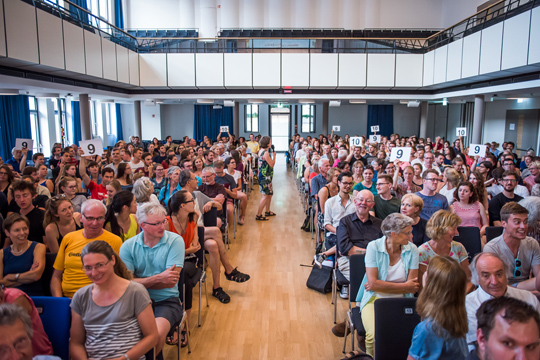Down off the high horse
Freiburg, Jun 25, 2019
Wit, charm and facts, facts, facts: The Wissenschaftliche Gesellschaft’s Science Slam is on July 3 2019. Freiburg researchers will present their work in the most engaging way. Last year, the physicist Maxi Frei brought her research into fuel cells onto the stage. To this end, she invented a fellow-student, Paul. He wants to lose weight and yet he still wants to drink shandies. Can Frei and her fuel cells help him? Sadly not. Nonetheless, her performance impressed the audience, and Frei won the prize. What do you need to do to get an audience interested in research? Frei let Pascal Lienhard in on the secret.

Have fun, and a story with a golden thread running through it: That’s the advice of Maxi Frei to researchers taking part in the Science Slam. Photo: Klaus Polkowski
Ms Frei, was it hard to present a complex topic from Microsystems Engineering in easy terms for the public?
Maxi Frei: The first time, yes. You need a really good idea, and a golden thread. It’s hard if you don’t have that. When I found it - by inventing Paul - the story almost told itself. And there was a real inspiration for Paul: At our conferences we were often jokingly asked if people could use fuel cells - which make energy out of glucose - so that they could then eat more chocolate. The idea came from people outside the discipline. Obviously, the idea was there. That gave me a starting-point. I gave the presentation over and over, in different forms, to friends and other students, and I polished the lecture using their feedback.
Did you get feedback also from people within the discipline?
Yes, I got positive feedback. Every researcher knows the tough job of having to explain research in simplified terms. There is what’s called the “granny test.” If even my grandmother can understand what I’m saying about research, then I’m explaining it clearly. And everyone is happy to understand something easily. When it comes to the Science Slam, that might not be a blinding insight. But you can certainly get the people on side. Some of them are happy they are learning something, others just like being entertained. Of course you can’t go as in-depth as you could in a lecture. But you don’t need to - the Science Slam is for a different audience.

Nine, ten, nine, ten: The audience gives its scores for the Science Slam presentations. Photo: Klaus Polkowski
Why is it so hard for researchers to explain their research so that everyone can understand?
You often need a lot of background knowledge to be able to understand something exactly. The big challenge is to get across the quintessence of a topic so that everyone gets it. I think that’s very important. Science and academia can’t sit on their high horse, this is not an elite event. Rather, we are trying to spread knowledge and make it accessible to all. And in this era of fake news, which undermines the credibility of serious studies, it’s important to maintain a channel of communication between academics and the wider public.
Do you have tips for the candidates who will be competing at the Science Slam on July 3?
First and foremost, it has to be fun. The more enthusiasm I bring and put into the presentation, the more convincing I am to the public. At the practical level, I recommend putting together a full-bodied story. As I said, you need a golden thread running through it, which brings it to a conclusion. Then the whole thing works better.

